#hong kong cultural revolution
Explore tagged Tumblr posts
Text
my god what is up with hong kong nowadays
today my younger sibling is recounting how their secondary school is penalizing their students for not singing the national anthem "loudly" enough, and so everyone was forced to re-sing it louder and resubmit it to the principal to review the performance
the principal's response? "they don't look patriotic enough when singing."
what the actual fuck.
my sibling in christ, what do you want them to look like. brainwashed robots??
i'm glad that i am in university now and dodged this nonsense the most that i can, but i'm still scared for the younger generation here. i Have family in the younger generation, like gen alpha type younger generation. what the fuck would this city turn into when they reach my age?!
3 notes
·
View notes
Text
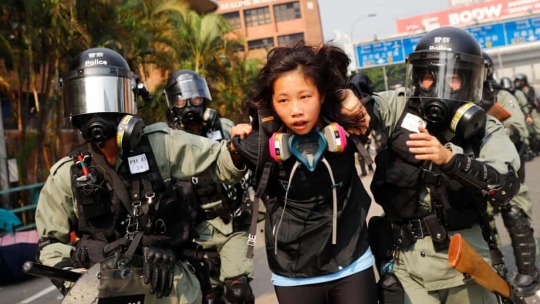
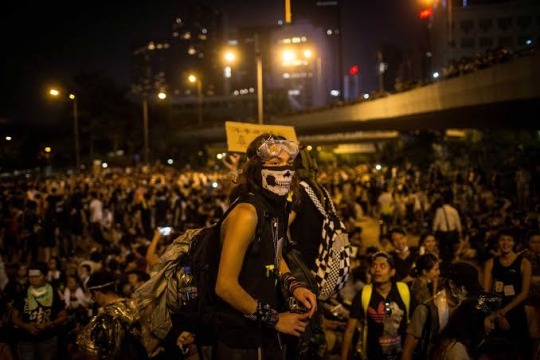
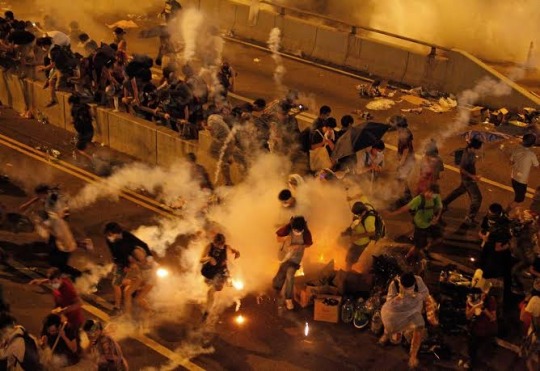
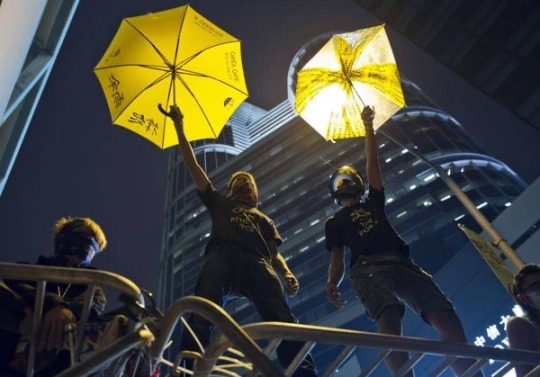
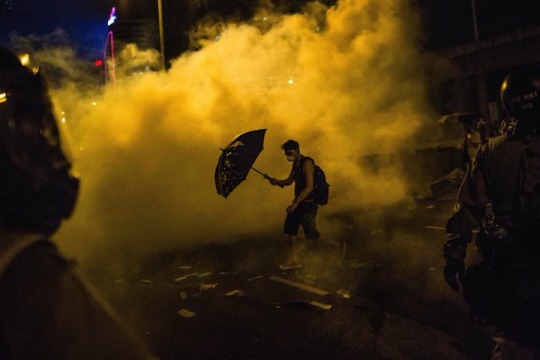
renaissance in the 21st century
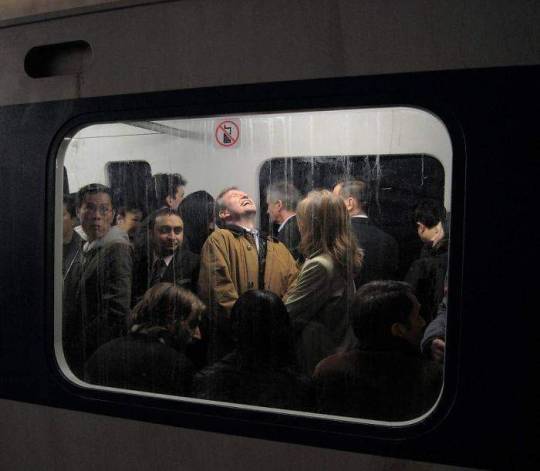


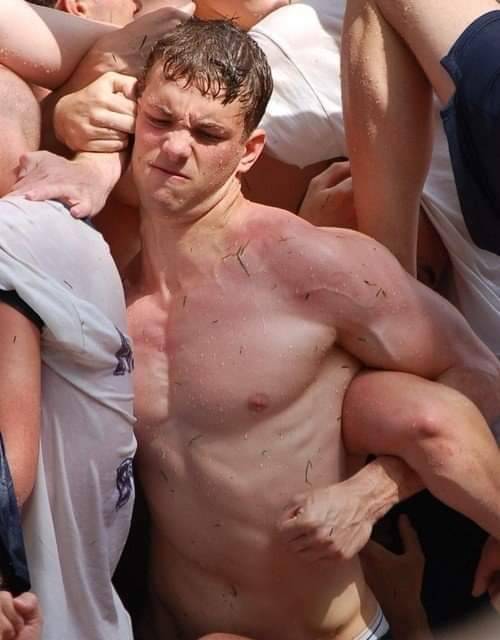
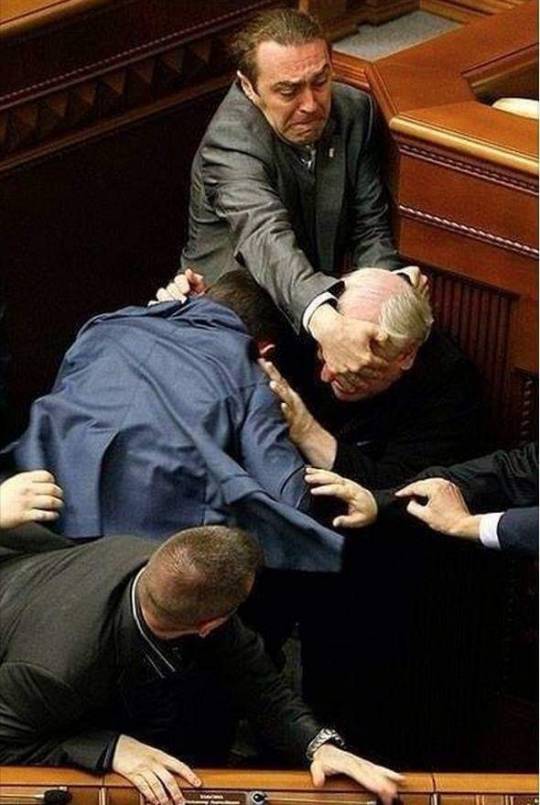
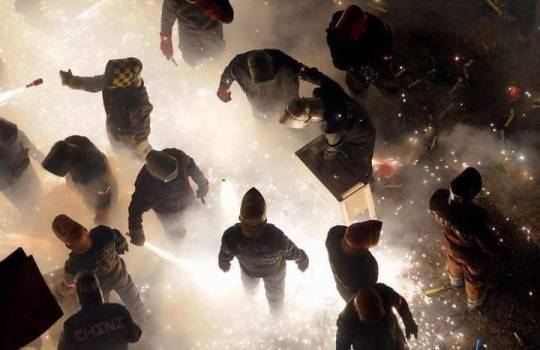
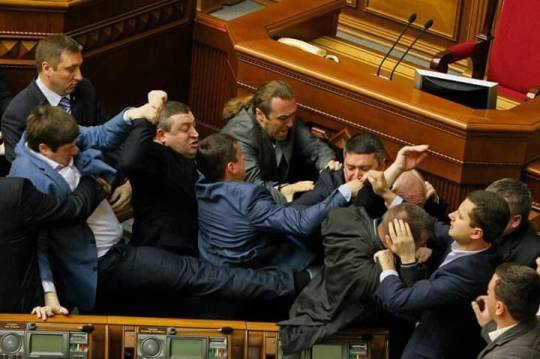
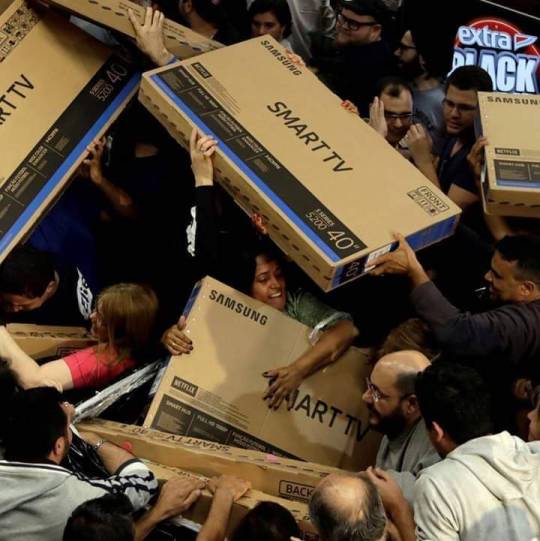
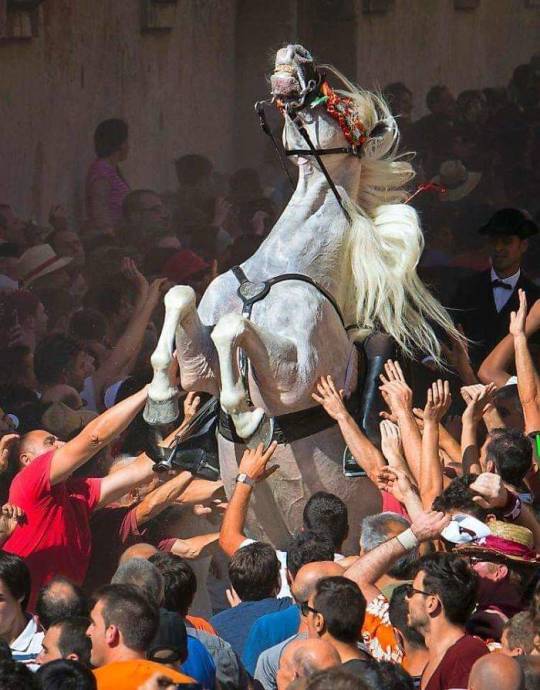
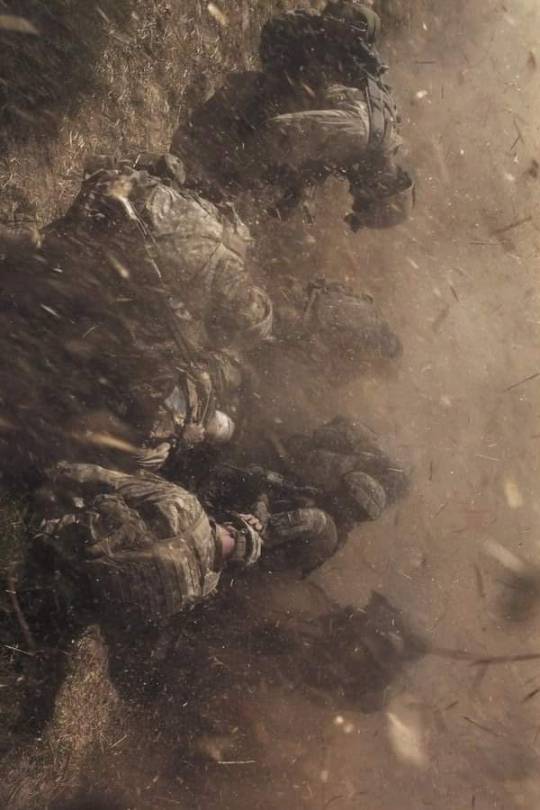
#the way the Hong Kong protests ended was infuriating and a tragedy.#but I am still so proud of my culture and my people for banding together to fight for their press freedom#police accountability and democracy.#as Hong Kong diaspora I want to go back and live there someday. but I don’t know if that will be possible for a long time.#people#sacred images#renaissance#venus writes#things of beauty <3#art#hozier#florence and the machine#hong kong protests#web weaving#be water#umbrella movement#umbrella revolution
367K notes
·
View notes
Text
Inside Out
Also I mean this as a way to bring awareness. Like how Magic Tree House or Avatar the Last Airbender teaches history. And plus if I were to write a historical book, I would put a lot of research into it like Michael Di Martino. And I know how sensitive communism is because my grandma was sent to a communist camp in China, so yea.
#inside out#inside out 2#disney poll#disney polls#disney#pixar#disney pixar#history#inside out joy#inside out sadness#inside out anger#inside out fear#inside out anxiety#inside out embarrassment#inside out envy#inside out ennui
11 notes
·
View notes
Text
The persecution of Christians in mainland China is spreading to Hong Kong, Release International has warned on the 35th anniversary of the Tiananmen Square massacre.
The massacre in Beijing's Tiananmen Square on June 4, 1989, brought a brutal end to pro-democracy protests and marked an increase in the persecution of Christians.
Release International stated in a report Monday that 35 years on, Christians in China are facing the worst levels of persecution since the Cultural Revolution and that the threat is spreading to Hong Kong, where national security laws have had a chilling effect on...
9 notes
·
View notes
Note
Weird question for you, non-royal. How do you feel about people (and I'm assuming its mainly us American people) planting a tree/buying a plot of land to be "given"a title? I'm on Scotland travel group and a few people said locals HATE that. I can see irritation if one expects people to call them by the title but in my view, it's just charitable giving vs harmful. But I'm American and our tendency to "pay more for better" may have made me jaded.
It's a great question :) If someone buys it as a gift for a friend and they laugh to themselves and move on with their lives, I can't stop them. If they bump into a Scottish person and announce to them that they have a "Scottish title" that's an issue. There's a few things:
What you are purchasing is the right to use their trademark. So it's like if I trademarked Lady of Jessicatown I could charge people to be able to use that. That's it. 1) You're not buying a title; partly because this company has no authority to hand out titles that actually mean anything but also because even if they were giving you the right to style yourself as Laird or Lady or whatever, that's not actually a title. Laird is basically a descriptor that shows you own land. If you've ever watched a period drama and heard an English character being referred to as a squire, that's what Laird means. It's as much a title as Mr or Mrs. and 2) you also aren't actually buying the land. They can't sell the same plot of land to multiple people, but it can't be legally registered so you don't own it. I'm sure you can imagine if I waltzed over to the US and said I'm not from the US but I bought a title and some land in your country when in reality you knew that was bollocks, it would annoy you!
Being "charitable" doesn't make something good. I personally cannot point to any discernible benefit these companies have provided. I also think if you really want to support the Scottish environment, just give to charity. If you step back and think about it it's someone looking at another country and only giving money to a community project so they could get what they believe to be land and a title in exchange, in a deal brokered by someone who isn't from the country either (the two biggest companies were set up by people from England and Hong Kong). That is absurd!! So that's why I don't buy when people claim it's for charitable reasons. It's because they want what they think is a title, and the charity part makes it feel ethical. If it was about charity they'd do some basic research and find out within a few minutes these companies don't really provide much benefit and are not respected by environmental organisations or local communities. Which should be enough.
There is a very painful history around land in the Highlands, where most of these companies have land. I won't go into too much detail but from the mid 18th to the mid 19th century there was a period we refer to as the Highland Clearances. Due to a combination of factors - the agricultural revolution and the desire to wipe out Highland culture - landowners set about forcibly removing the local farming communities who'd worked on their land for generations. People had their homes burned to the ground by wealthy landowners, tens of thousands of people were forced from their communities, and lots of people died because they had no food or shelter. This is still an issue today in some ways as Scotland has a real problem with private land ownership. About half of Scottish land is owned by around 400 people. Many of them are absentee landlords - they own huge plots of land but only come up to go hunting a few times a year. They also often don't protect the farmers who rent their lands, just like they didn't in the Highland Clearances. A lot of them do real damage to the community: demolishing homes, cutting the land their tenants have for farming, poor environmental policies. And these "title" companies have to come in and buy huge swathes of land in order to be able to pretend to sell you some of that land. So because of historical and present day issues, there is an innate cultural sensitivity around land ownership in the Highlands which these souvenir plots tap into.
19 notes
·
View notes
Text
if you're ever in doubt of your general knowledge skills, just know you're not the friend who turned to me during Crazy Rich Asians to ask "wait i thought it was bad to have more than one child in Chinese culture?"
Shout out to me for NOT infodumping everything I know (not that much) about the one child policy, the cultural revolution, the chinese state's non-communism, Hong Kong, rich ethnic-Chinese communities in south asia.....
I should honestly do more reading on all that. I'm probably extremely out of date and fairly mainstream in my knowledge.
6 notes
·
View notes
Text
[TRANSLATION] Leslie's Everything: Tell-All Interview

Upbringing
— First, please allow me to ask you about your upbringing. My family was a textbook example of a middle-class family in Hong Kong. My father was a famous tailor who made clothes for Marlon Brando, Alfred Hitchcock, and WD Hamilton among others, so he earned quite a lot of money for some time. Since my father had come from the Mainland quite recently, he was still distrustful towards Hong Kong in general, so he brought all the money he had earned back to Mainland China and saved it there. Unfortunately, in the Cultural Revolution, all his property was taken away.
— What was your father like? I don’t really recall much about my father because I never lived with my parents. They were busy with work and rented a place somewhere near Central, where they worked. All of us kids lived at our grandmother’s home.
— So would it be accurate to say that you were loved most by your grandmother growing up? Because my grandmother was already quite old, the person who took care of me was a nanny called “Luk Jeh” (lit: Sister Six)* . She was probably the person who understood me most when I was young. * T/N: “Jeh”, lit. sister, is a common term of endearment / politeness for an older woman you are friendly with in Chinese.
— What was “Luk Jeh” like? She’s the greatest woman I have ever had the fortune of knowing. She gave all her love without ever asking for anything in return. She treated everyone like that, but she was especially kind and loving towards me. Regrettably, I’ve never met any woman like her for the rest of my life.
— And her elderly years? After she got old, she lived alone in the house I bought her. She passed away in 1990 in her eighties.
— What’s your most vivid memory from your childhood? When I was six, my grandmother passed away. My grandmother already couldn’t move her feet a few years before her death, so she just sat on a chair the whole day. She would only return to her bed to sleep. When I arrived home that day, I found that she had passed away sitting on the chair. I still remember that scene like it was yesterday.
— What about your brothers and sisters? I was the youngest out of ten brothers and sisters. But two of my brothers (the third and ninth oldest) and one of my sisters (the fourth oldest) passed away when they were little, so there were really only seven of us. I have the same birthday as my deceased brother (the ninth oldest), so they all said that I was his reincarnation. However, even though I had a lot of siblings, the age gap between us was so big that we didn’t really play together. My father wasn’t the kind of man who liked having kids around and my mother was very busy, so I wasn’t very happy as a kid. If you asked me to recall some happy memories from my childhood, I wouldn’t have anything in mind.
— What were you like as a child? I was a bit odd. I wasn’t that childish - I didn’t speak a lot and I was never noticed by the people around me. My family wasn’t especially large, but when we had guests they never noticed my existence. I’m not sure whether I was just born this way. I was very alone and never had anyone to confide in, so maybe that unknowingly shaped my personality.
— Didn’t you play with the kids next door? My parents were very strict. My parents banned me from playing the fun things that the neighbours’ kids liked to play, such as flying kites and milk caps. Back then, you could tell whether a family was sophisticated based on the games their children played. Perhaps my parents didn’t want people to think of us as unsophisticated and lower-class.

About his parents
— It seems like you don’t have many fond memories of your parents. Maybe it just wasn’t meant to be. Our bond was just too weak. There was only one time where my father stayed at home for five days during Chinese New Year. On three of those days though, he was drunk and asleep. That’s my only memory of us living together, so I don’t really understand the familial bonds and love of a regular family. In fact, when I grew up, I was more like a friend to my parents rather than their child.
— When did your father pass away? 1989, the year I left the music industry. When my father passed away, I was touring for “Final Encounter”, so I couldn’t even see him for the last time. It really wasn’t meant to be for us.
— What memories do you have of your mother? In comparison to my father, my memories of my mother are more vivid. In 1988 my mother came to live with me and we lived together for half a year. But… how do I say it? I was used to living alone and my mother and I never had that close mother-son bond, so we couldn’t feel that kind of familial love for each other right away even though we moved in together. I kept trying to close the distance between us and connect with her emotionally, but in the end I could only give her money and material things, so my mother didn’t really seem happy.
*Interviewer’s Note: Leslie’s mother passed away on 18 Oct, 1998*
At that time my mother’s relationship with my father was worsening and she was quite emotionally unstable. Even though she loved my father dearly, he often ignored her. Anyone who was not my father couldn’t make her happy no matter what they did. Even though I tried really hard to cheer her up, I still couldn’t heal the wounds in her heart.
— But you still had a special kind of bond with your mother in contrast to your father, didn’t you? Yes. For example, I always thought it was my father who wanted me to study abroad in the UK. I only found out from my uncle after my mother’s death that she fought for me to go there. My uncle told me that my mother begged my father many times to let me go to the UK… So even though my education wasn’t perfect, the person who let me set up such a good foundation was still my mother.
— Did you think about your mother after she passed away? To be honest, I thought I would just move on after my mother died. But when she actually passed away, I started thinking about a lot of things. I didn’t recall my memories and experiences with my mother - rather, I realised the importance of my mother’s existence in of itself. My birth, the things that bring me joy, sadness… really all kinds of things… I got all of these from my mother when I thought more about it. That’s why I’m really grateful to her.
— Do you ever regret not doing more for your mother before she passed away? *brief silence* …Personally, I feel that I did my best to do everything I was able to do, so I don’t really regret anything. If you asked my mother, she would most certainly be satisfied with what I did too.
Maybe I'm a bit traditional. I’m a strong believer in things like destiny and fate. For my mother and I, we didn’t realise the importance of our existence to each other until a few years before her death. But when we both understood that, it was already too late. She wasn’t able to be my “Ultimate Partner”, but I guess it was just meant to be that way. We couldn’t change it. There was no way to.
First loves and life as a student
— Who was your first love? What was she like? It happened when I was thirteen. To be honest, I’m not even sure if that counts as my first love. She was a very fast runner and was always training. Good looking, slim and looked a bit haughty. I liked those girls when I was younger. Not long after we met though, I left for the UK and nothing really happened between us after that. Three years later I came back to Hong Kong and met her again. The two of us went to Macau together to have some fun and it was there that I had sex for the first time.

— You were sixteen when you lost your virginity? Wasn’t that quite young for your time? Hm, I guess so. But at that time we felt that we loved each other so we just naturally took that step.
— “At that time”? Does that mean you later found out you didn’t actually love each other? Put it this way. We slowly found out that we didn’t look at problems the same way or have the same worldview. Eventually, she got married to one of my classmates and they even had kids. We bumped into each other last year, but we just chatted for a bit before going our separate ways.
— Do you still think about her a lot? No, no. I think she lives overseas now. Either way, even if I saw her right here right now, I don’t really have any special feelings for her anymore.
— You must have been very popular with the girls when you were still in school. You mean me? *very blunt* Not at all. I didn’t even think about if girls would like me. Even though my friends and classmates really wanted to win the affection of girls, I didn’t really feel that way. I was just really invested in sports like netball and volleyball.
— Are you an introvert then? Maybe. At the very least, I’m definitely not an extrovert. *laughs*
Dream Job
— As a kid, what did you want to be when you grew up? I actually had two dreams. First, I wanted to be a doctor. But I inherited shaky hands, so that was out of the question. I also wanted to be a pilot, but I was scared, so that was out of the question too. *laughs* Even now when I’m on a plane and there’s turbulence, I get scared.
— And now? What’s your current dream job? I want to be an interior designer or some kind of art critic. I’m really interested in that kind of stuff. Also, I really really want to be a very talented pianist. The piano really is an amazing invention. If you’re stressed, you can just play the piano and all your worries go away.
I especially want to play the piano because I compose my own songs now. But I guess if I was actually able to play the piano, maybe I wouldn’t be able to compose songs freely!
— It’s not too late to start learning how to play the piano! No, no. I couldn’t before, I can’t now, and I can’t in the future… my left and right hand aren’t the same. When I was 22, I had two tumours on the back of my left wrist and the bone of my left hand. I even had surgery done for it. Because of this, my left hand slowly became smaller and couldn’t exert much force. I did a lot of stuff to keep it balanced with my right hand and it looks mostly normal now, but my left hand is still quite weak.
Studying in the UK

— You went to study in the UK when you were only 13. Did you want that for yourself? Or was it just your parents’ wishes? Of course I wanted it for myself. I had good grades in primary school, but they slid straight down when I got to secondary school because I was terrible at maths. In secondary school, there was algebra and all kinds of weird stuff. The material suddenly became much more difficult. I was always a humanities type of guy. I excelled in subjects like literature and music, but I was horrible at science subjects and maths. I wasn’t good at theoretical and sciencey stuff. I heard that the maths was much easier overseas: Oh, so there’s a way out! That’s what I thought at the time. *laughs*
— And was the maths in the UK really easy? Yeah. Even I managed to get by. My best subject was English Literature. I was the best at it in my grade and even got a prize for it.
— And which writer did you specialise in studying? DH Lawrence and Shakespeare. I loved reading poems even when I was in Hong Kong and I even won prizes for reciting them in a few competitions. I’m the type of person who’s really good at distinguishing between what I’m good at and what I’m bad at.
— You mentioned earlier that you want to be an interior designer. But wouldn’t that be difficult if you’re not good at maths? Yeah. Honestly, I’m really interested in architecture and design, but if you actually let me design a home, it might all fall apart really quickly. So if I were to actually become an interior designer, I can only work on the decorations and arrangements. *laughs* Stuff like this piece of furniture should go here, that kind of furniture should go with this decoration… That’s about the extent of my capabilities. I’d get in trouble if I did anything else. *laughs again*
— I noticed that you didn’t study literature in university. Yeah. I majored in textile management. That was my father’s wish. As a father, it’s only natural for you to want your children to learn something related to your own career. Unfortunately, half of my father's body became paralysed because of his drinking habits before I could graduate. I was therefore suddenly told to come back to Hong Kong, so that ended in failure.
Becoming a singer and idol
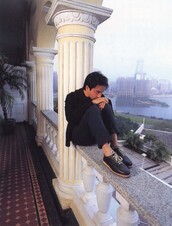
— When you came back to Hong Kong you joined RTV (now ATV)’s singing contest. What was that like? I often sang at the place my friends worked at when I was in the UK. When I came back to Hong Kong, I found that English songs were quite popular so I wanted to see if I could break into the industry. To be honest, I was half goofing around. I never thought about becoming a singer.
— But you got second place and signed a contract with RTV… I did, but I didn't become popular instantly. From 1977 when I debuted until I released “Monica” in 1983, I was pretty much a nobody. During that time I sang English songs and wore jeans and sweatshirts, but the trend back then was for people to wear suits and sing seriously. I was young and had a baby face. Maybe I just didn’t fit the requirements for an idol of that time.
— Do you have any unforgettable memories from that time? Oh, I have a lot. I can think of one incident that was the most painful - no, miserable for me. One time, I was a performer at a concert where a lot of famous singers were performing. When it was my turn to go on stage, I threw my hat into the crowd. No one caught it - in fact, they tossed it back! That was so cruel. *laughs* There was a time when I had to go through stuff like that. Now I’m almost nostalgic for it, but I was pretty incensed about it back then.
— On the other hand, you started playing major roles quite early on in your acting career. Were you always interested in becoming an actor? I’ve always been interested in acting. I was lucky that as soon as I started out, I was already playing the main characters. If my memory serves me well, my first movie was released in 1979. It was a comedy with some… slightly sexual parts. But because I didn’t really have a choice in the roles I played, I took on all sorts of roles. I was young and wanted to earn some money, so I just acted in everything. Even though I can’t be proud of some of my parts, I don’t regret anything. That’s how people mature along with time.
— Are there any of your movies that you wouldn’t want to watch again? No, actually. But when I see some of my older films, I feel bad just thinking about my situation at the time. Back then, I never had over HKD$1000 in my bank account. I kept thinking, “Wouldn’t it be nice to have a thousand dollars…”
— Didn’t you feel disheartened during those seven years of being a nobody? To be honest, I never found that period long. The reason I say this is because the entertainment industry at the time didn’t really have anyone who became a star the moment they debuted. It was practically common sense that it’d take ten or so years to become a star.
— So did you believe that one day you’d become a star too? Hmm, how do I say this? Even though I wasn’t totally sure that it would happen, I was always waiting for an opportunity to arrive. The stars at the time like Sam Hui, Roman Tam and George Lam influenced me heavily too. In Hong Kong though, it’s impossible to become famous or popular just by copying others. You can’t become a star without your own speciality or being unique.
— Were you influenced a lot by Japanese idols? A lot. I feel like I’m more influenced by Japanese singers than local ones. Hideki Saijo, Kenji Sawada, Mayumi Itsuwa… and especially Momoe Yamaguchi, all influenced me heavily. My version of her song, “The Wind Blows On” was certified gold. “Monica” did even better and was certified platinum. To me though, “The Wind Blows On” was more impactful. That’s why I put the gold record in my coffee shop as a decoration.
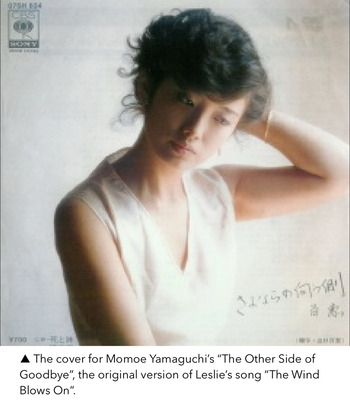
— From that moment onwards, you became an extremely popular idol. What was the life of an idol like? I was much busier back then than I am now. As someone who was both acting and singing, my work was mostly for my singing career. Also, the need to win awards was much stronger… like a “hungry artist”. Whatever opportunity arose, be it an advertisement or a performance overseas, I would take it. At the time I was just constantly in an emotionally taut state. An idol’s life isn’t as happy as people think it is. To satisfy the audience, you have to constantly be charming and handsome. For the audience, for your fans… I kept thinking like that and slowly lost my sense of self. It was like I wasn’t myself anymore.
About Mr Tong
— Do you think your personality is suitable for being a celebrity? I think so. I’m not really a fan of a fixed work schedule and job, but in this industry, the people around me all help me and I decide the rules for my own game. Of course, as an idol, sometimes your privacy gets violated which isn’t a pleasant feeling. But I’ve never liked jobs with rigorous schedules. As an artist, as long as you put out good work, you can create the rules. That was really attractive to me.
— Are you bothered by gossip? I’ve gotten much better at dealing with it. I think it’s because my fans don’t believe in all those unverified news articles springing up everywhere - rather, they believe in me and my integrity. People who believe in gossip won’t believe me no matter what I say. So there’s really not much use in being bothered by gossip. In the end, people will believe what they want to believe.
— Even though you say that, it must make you uncomfortable. They have no right to say those things… Well, of course I’ll feel uncomfortable. When talking about my mother’s funeral a while ago, the press chose to put the spotlight on Mr Tong (Daffy) rather than my mother’s death. I thought that was really unfair and it showed no respect for the dead. Even though I’m an artist and it’s only normal for people to write about me, I can’t tolerate people writing all kinds of rubbish about my siblings and my friends. They shouldn’t be the target of the media’s abuse. I really want to protect them, and I feel that I have the ability to do so as well.

— To you, what’s Mr Tong’s position in your life? He’s my best friend. I can tell him everything. He’s like a little brother to me. We’ve known each other since we were young, my mother was his godmother [Interviewer’s Note: In China, apart from biological parents, people have the habit of getting godparents 乾爸媽 for their children’s future. People treat their godparents like their own relatives.] Especially after his family moved to the US… he was just like a member of our family.
I think I’ll be indebted to him for the rest of my life. Before I became famous, I urgently needed a good amount of money because of a certain incident. I think that was the toughest time of my life. He didn’t say anything and just found a way to get the amount of money. That was worth months of his income. I only heard through the grapevine later that he ate only the cheapest takeout for lunch every day afterwards because of how costly it was for him. He was the only friend who treated me so well in my hour of need. So I’ll always treat him like my lifelong friend. He’s not just one of my friends. To me, he’s a very special, very important friend.
— The media has been speculating a lot about your relationship with Mr Tong. What do you think about that? I really hate it. I’m okay with it, but he’s just a normal guy. Yet the reporters chase him all around Hong Kong and take all kinds of pictures. It even disrupts him from doing his job… I really feel ashamed about it.
It’s the same for my brothers and sisters. Don’t write all kinds of rubbish just because one of my siblings is getting divorced. I’m alright with the press writing whatever about me, but I really don’t want you all to write about my family and friends. That’s just not fair!
On dating and marriage
— Let’s talk more about you. People say that a big part of your charm is your mysteriousness… That’s because I don’t talk about my personal business in public and I rarely make news for the press. How meaningless would it be if I just exposed everything about myself? Of course, I’m not saying I shut myself in at home every day and hide from everyone. The reason why I opened up a coffee shop was so that I could create a place where I could meet my fans. As long as you bump into me, I’ll sign an autograph for you and we can even take pictures together. My door is always open.
However, I don’t want to publicise my home, my life, and my friends and family. I just want to keep my privacy. There’s always someone asking, “Don’t you want to get married?”! That’s my own personal business. I don’t think there’s a need for me to answer that question. — But as your fans, it’s only natural for them to care. They’ll think, “Why can’t, or rather won’t, a guy as charming as Leslie get married?” Do you really want to know that badly? *laughs* To put it simply, I’ve never had any dreams about getting married. I don’t dare to believe in marriage. There’s a lot of divorcees in my family. My parents didn’t have a good relationship and I grew up seeing multiple of my siblings going through divorces. So I’m not really confident in the idea of marriage. I don’t have a good impression of it. So maybe I’ll never get married (asks the interviewer) Are you married? Do you have a good relationship with your husband? Have you considered getting a divorce? (asks very quickly)
However, although I may never get married, I still care a lot about my family. Ever since I was young I didn’t really have a relationship with my home and relatives, so now I really care about “home”. I only put things I like in my home - I want to create a space where it’s okay to relax.
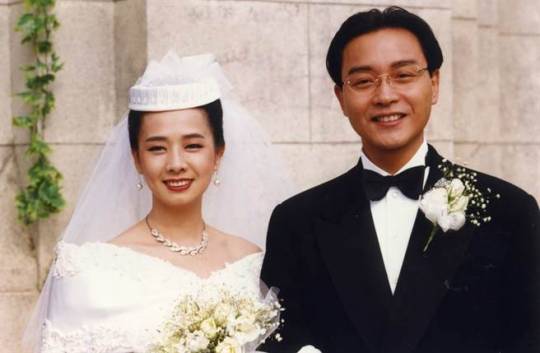
Above: Leslie Cheung and Teresa Mo for All's Well, Ends Well (1992)
— Have you really never thought about getting married? I have! That was when I was still very young. I think at the time I was only 22. She was a little older than me and we considered the idea of marriage very seriously. But out of the blue, she suddenly started acting very oddly and it was like her wires were crossed. I didn’t really know why, and at the time I was still young; in short, it was a really difficult ending.
— So you never seriously considered getting married after that? I didn’t. It’s almost definitely because my standards are too high. I’m really strict towards myself and everyone else. A normal person might be satisfied with 70% perfection, but I’d only be satisfied at around 95%. So something that’s normally satisfactory becomes unsatisfactory in my eyes. Tong always tells me, “You’re a perfectionist. Even if it’s really great, you’re still not satisfied, so I really pity you.” But when I look at him, even if it’s something very small, he's really touched and happy, so sometimes I really envy that. But I still can’t lower my standards.
— Even towards women? Hmm, you could say that if I like someone, I’ll have a lot of expectations towards them, which ends up in disappointment. I’m scared of that kind of disappointment. Besides, I’m 42 now - I’m at the age cap for liking someone! Even if a 20-year-old girl was in love with me and I liked her too, considering my age and my own personal stance, I know we can’t end up together based on feelings alone. Problems regarding the future, our environment… there are just too many problems to consider. As you get older, apart from becoming more demanding, you also lose more of your passion and vigour, so it’s kind of difficult.
— Even though you say that, there are definitely plenty of women who like you. I don’t know… at this age, you can’t just fall in love! For example, if a girl told me “I love you,” I’d have to think: “Huh. Why is that?” *laughs* Really! I get scared just considering things about the future. Because for two people to coexist together, apart from love, you have to understand each other in all aspects, such as your personality, way of thinking, lifestyle… Take me and my mother as an example. Even though we’re mother and son, living together suddenly after being apart for so many years and trying to understand each other was really difficult. Of course, it’d be best if we could love each other from the bottom of our hearts and fully understand each other…
— It seems like your emotional state is really important in making a decision like this. Of course. As long as your hearts and souls are connected, even making love isn’t important. Of course, I don’t want to deny its importance either! *laughs*
— May I ask who you love most right now? Talking about who I love most… probably myself. If you’re talking about people other than myself, I guess you could say that as long as I truly like them, it doesn’t matter whether they’re male or female.
— So you’re bisexual? I’m trying to say that if someone loves me and I love them back, their gender doesn’t matter. Doesn’t matter how I say it, I won’t be able to find that kind of happiness anyways. If you’re okay with both men and women, your chances are doubled. What’s not to like? *laughs*
As a superstar
— In “Farewell My Concubine” and “Happy Together”, as well as your provocative dancing in red heels during your 97 concert… These are a series of explorations past your own gender. Are you trying to send a certain message? No, they don’t have any special correlation. I’m not trying to send any particular message either. In “Farewell My Concubine”, Director Chen Kaige told me I had been mostly playing handsome young men. I had a pretty stable image, so he wanted me to be able to play a cute woman too as an actor. As for “Happy Together”, it was because homosexuality was a hot topic back then, so I thought maybe it’d be interesting to play a gay man.
For my concert, it was because I needed a little excitement. That wasn’t my idea though - it was the designer in charge of costumes and arts. David Bowie’s feminine performance on stage had a huge impact, so he said it would be very meaningful to do it in Asia too.
Actually, our original intention was to do Beijing Opera. But the clothing and makeup would be quite a hassle, so we wanted to find something that could replace it. We thought of putting on red lipstick based on the theme of the song “Red”, but the Hung Hom Coliseum is huge. You wouldn’t be able to see the lipstick all the way up in the spectator’s stand, so I just wore red heels instead.
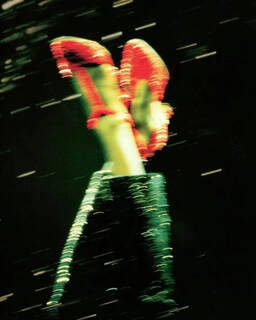
— Watching your concerts or films makes people feel you’re very self-absorbed*. Are you that way in real life as well? I do play a lot of narcissists in my films. For myself, how do I… *thinks for a rather long time* In my movies or concerts, I hope to show the audience the best me. But outside of work, I don’t even look at the mirror, and I don’t really care about my own appearance. At the very least, I’m not the type of person who likes hanging their own photos in their home or in the shop. * T/N: The word used in the original is 自我陶醉 (literally drunk by yourself). It does not necessarily have a negative connotation and is used to refer to when someone is very absorbed in what they are doing, and is enjoying it a lot. The term can also be translated as narcissistic depending on the context.
— But objectively you are quite handsome. What do you think when you see your reflection in the mirror? “Wow, he’s so handsome!” *laughs so hard he bends over* No, no, I’m just joking. You can’t really judge your own appearance objectively.
Think about it, it’s just a face you’re used to seeing since birth.
For a long time, people who don’t know me well have said I’m “pampered”, “cool”, “efficient”... to be honest, that’s not even true. I just like saying whatever pops into my head, so people think I’m a stuck up guy. Chinese people generally beat around the bush and avoid directness to be polite. For a guy like me who just says everything directly, it’s easy to get into trouble. But I guess that has nothing to do with being self absorbed.
— People describe your charm in a lot of ways, like “cute”, “handsome”, and “sexy”... which word makes you the happiest? Coming from my fans, it doesn’t matter if the word is cute, handsome or sexy - I’ll be happy either way. But if it’s someone who knows me well, then I won’t be happy with any of those words. There’s nothing worth being happy about when you’re only praised for your looks.
— So what descriptor makes you the happiest? “Good fellow”, probably? Among all the words of praise, this one moves me most.
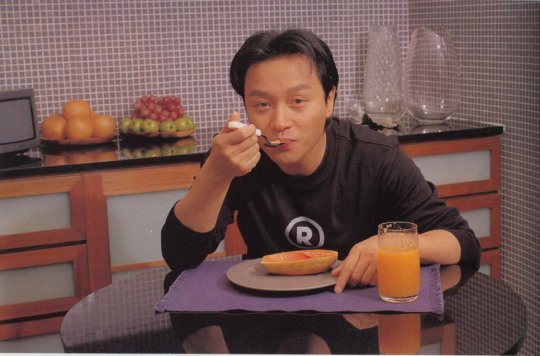
— Is Leslie Cheung the superstar actually you? Or is it a persona you've played as and released to be a marketable product? Oh, this is a difficult question. I don't really feel that I'm consciously playing a role, so I guess it should be me. There's no gap between me and "actor Leslie". *asks the interviewer* Don't you think that's my worth in a film? Also, I feel like the potential and talent needed to be a star are qualities that I possess.
Actually, people are just like kaleidoscopes. It's impossible to only show people one side of yourself. But whether it's fans or the media, they tend to only look at one side of us and make judgements based on what they look at, which creates all kinds of misconceptions. The fans tend to only like looking at the almost mythical parts of their favourite celebrities. The media also tends to make mountains out of molehills when they don't have the full picture. But the truth is, those are only variations in the pattern of the kaleidoscope.
— You could say that the job of a superstar is to sell variations in the kaleidoscope’s pattern, so it should be quite high-stress. What do you do when you feel that your stress has reached its limit? Yeah, so it’s actually really important to relax yourself. For me, I choose to go on holiday. I go somewhere no one knows me. Lately I’ve fallen in love with hot springs.
— You already have things that most people want. Positions, reputation, money, beauty, charm… If there’s something missing, what would you say it is? *thinks for a moment* Maybe education? Because I quit halfway in university. It would have been nice if I studied more during that time. If it’s possible I’d like to study all the way up to a doctorate. There’s too much that can only be learnt during your student days.
As an actor
— Do you like rewatching your own movies? Or do you not really watch them? Mm, I probably count as the type that doesn’t really watch them. Because when I watch my own films, I keep thinking things like “Oh, that’s not quite right”, or “If only I acted this way in this scene”... I mind a lot.
When I’m acting, I’m really immersed so I don’t have the time and energy to look at it objectively. After doing it all in one go and looking at it afterwards, my flaws are very obvious from a third person perspective. From a mental health perspective though, it’s not really good to dwell on regrets about something you can’t change.
— So far among all the roles you’ve acted in, are there any which you can say you interpreted flawlessly? *No hesitation* No. For all my films, if I rewatch them, I always think “I would do better if I did it now…”
— Your acting skills have clearly matured over your career, especially in romance scenes. Is this a result of gaining experience or because you consciously put in work on these scenes? Really? I got better at romance scenes? *laughs* If so, personal experience would certainly help, but it’s more that I slowly matured through constantly acting. Your acting skills are like a deposit book. If you keep putting in money, one day you’ll reap the rewards. When a melon is ripe, it falls off its stem… the time each person takes to get there is different, and of course some people never get there at all. It’s not just personal hard work, many other factors like whether you can meet a good director are all really important.
— Not just your romance scenes, there’s something unique in every way you move on the big screen. Even if it’s just your silhouette, people know for sure it’s you. Is the way you carry yourself something natural or is it a conscious effort? I never consciously thought about that. It just came about naturally. I don’t think there’s any particular “method” of acting, you’re not consciously doing this and that. I just do what I think is the most natural thing to do in that scene. In other words, I do what I think that character would do. I’m just recreating those movements.

Some actors have their best angles figured out and work out how they are best captured on camera. But I don’t really enjoy consciously acting like that. My expressions and movements are the best when I just act like myself. That’s the most natural.
However, when you keep reshooting a certain part, like the opening and ending of a certain shot, it’s easier for the editors if you do the same thing every time. But repeating the same movement over and over again really bores me, so I start trying out some different interpretations.
If the acting is very successful, the director is only human. They would also think that it’d be a waste to cut out that scene even if they have to change what they originally had in mind. What the audience sees is made up of all the best shots.
— Either way, there’ll still be a marked difference in the performance of a good actor and a bad actor. Well, of course. Talented actors or actors of a high calibre make you forget their acting. You feel like they’re just being themselves. That’s because they’re unique and not an imitation of someone else - that's why they’re convincing.
In comparison, those “average” or untalented actors are often unwilling to challenge themselves so while they don’t make huge mistakes, they also can’t make the audience feel the character fully. They make no attempt to be unique and instead subconsciously copy people around them.
— You’ve played many roles alongside several prominent leading ladies. As you continue to play these roles, your partners get younger and younger. It may not look like it but there’s actually an age gap between the two of you. Do you feel the age gap between you and your costars? Yeah, it’s like that now. *laughs* To be honest, lately with my costars it feels more like I’m teaching a student rather than acting with them. In fact when actually on set I become a teacher completely. *laughs* However, even though I feel the age gap between us, I have a baby face, so it also looks unnatural if I act alongside the actresses of my generation. I guess it can’t be helped.
On the movies he's starred in
— Which one of your starring roles was the hardest to play? *thinks for a moment* Ho Po-Wing in “Happy Together”. I was feeling unwell* during the shooting and I had to arrange all kinds of things for my upcoming concert which made me really nervous. Wong Kar-wai’s the type of director who doesn’t prepare a script and there were all kinds of problems. It was especially difficult to make Ho Po-Wing, whose personality is horrible, a charming character. I was really worried about that. * T/N: Leslie had amoebiasis during the filming in Argentina after eating contaminated food. — You still pulled off the role successfully though. You were even nominated for the Hong Kong Film Award and Golden Horse Award for Best Actor. That was really unexpected. I didn’t really think I was the main character in “Happy Together” so I didn’t think I was qualified to be nominated.
— Do you think you were qualified for the award for your roles in “Days of Being Wild” and “Ashes of Time”? The panel decides who gets the awards. I can’t really judge whether I’m qualified to get a prize. If there’s any film of mine which I think should be qualified to win something, it would probably be “Farewell My Concubine”. It won the Palme d’Or at the Cannes Film Festival. I was also really delighted to hear that it was a critical success in Japan.
— Was it easier to play Cheng Dieyi in Farewell My Concubine compared to Ho Po-Wing in Happy Together? Yeah. I liked Dieyi’s personality more too and we had more in common, especially his dedication and meticulousness towards art and love. I felt that really deeply. It was difficult to grasp the Beijing dialect and learn Beijing Opera though. But overall in all aspects, it’s an unforgettable film for me.
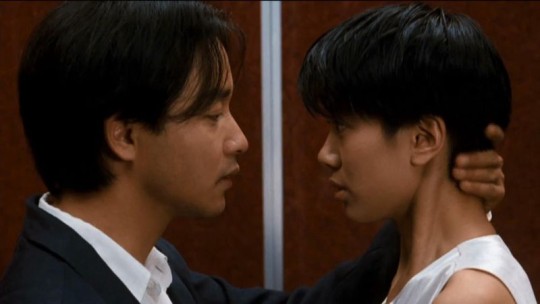
— “He’s a Woman, She’s a Man” is a film portraying the workings of the entertainment industry. Fans think that Koo Ka-ming (Sam) is actually a depiction of you… Not at all. I can’t write songs and I can’t play the piano either. *laughs* I guess we behave similarly when we’re single… Looking inward, if there are any similarities, maybe it’s in our living habits and worldview. We're more stubborn about that. As for some other aspects, some of those are just my own personality peeking through. Like the scene where I’m very scared and stuck in the elevator. Actually, that was just my real reaction when imagining the incident occurring to myself. Did it look real?
— I see. So that scene was just you. I always felt like that fear seemed too real. *laughs* Now that I’m talking with you though, I do feel that you share far too many similarities with Sam Koo. Hm, really? Okay, maybe a bit. *laughs* But to be honest, rather than Sam Koo being like me, Sam Koo is like the director Peter Chan.
Directors and Actors
— Speaking of Director Peter Chan, I wanted to ask you about the directors you've encountered. You worked together with Chen Kaige in "Farewell, My Concubine" and "Temptress Moon", so I suppose he's one of the directors who really appreciates your talent. He does like working with me. The script for "Temptress Moon" was written after I was chosen to play the lead role. A so-called "tailor-made" script for me.
— There are rumours that you were originally going to star in “The Emperor and the Assassin”. I was invited to, but my schedule didn’t allow for it. The shooting would take around a year but I had a world tour going on, so I couldn’t give him that much time. There’s also another reason. The main character of the film was a tall, strong, broad-backed guy in Chinese people’s imaginations… I’m too far away from that kind of image.
— The roles you play in Wong Kar-Wai’s films and Tsui Hark’s films are totally different. Is this because the two directors have different impressions of you? Maybe it’s because they’ve observed different parts of me. Besides, the content of their films is quite different. Wong Kar-Wai’s films are in a unique, perhaps “dispirited” or nihilistic world. Even though the time or location of his films varies, the world he’s trying to create is always the same.
Comparatively, Tsui Hark’s movies always have some kind of hidden philosophical or political thought. Even if the movie is very dark, there’s always hope and light somewhere. Do my roles reflect the differences in their films?

— It was quite shocking to see that you didn’t need guidance from the director (Jacob Cheung) on the set of “The Kid''. Instead, you mulled over and interpreted the role yourself. Is this the norm for you? Pretty much. Directors rarely adjust my acting. That’s why some people can’t stand it when they work with me for the first time. Generally, directors think that acting is something the director arranges for you.
But to be honest, once they start filming, they begin to recognise my acting and usually take my opinions and advice into account. Of course, people don’t think the same way, and my opinions may not be the same as the director all the time. But I’m dedicated to every role I play, and I always hope that I can make a good film. That’s definitely something I share in common with the director.
— In terms of acting skills, you don’t really need a director… How could I? It’s impossible to imagine not having a director. Think about it - no matter how good actors are, they’re always in first-person perspective. An expert looking at you from a third-person perspective and correcting your technical errors, which is the director, is absolutely necessary. Of course I might disagree with the director, but that’s a really important part of making a good movie.
I’m a really lucky actor in that I’ve worked with a lot of great directors. John Woo, Chen Kaige, Wong Kar-Wai, Peter Chan, Jacob Cheung… all of them are excellent directors. The fact that they think I’m a good actor makes me happier than anything else.
To be honest, how good a film is rests almost entirely in the director’s hands. The director is the lynchpin. A movie is a treasure chest and the director is the key. Whether you can unlock it and get the treasure depends totally on the director. That’s why my goal for now is to become a director.
About the future

— Have you already begun work on your directorial debut? I’m working on it. If all goes well, I should be able to start filming in the spring (1999). I haven’t really decided on the contents though.
— As a director, who would you consider picking to be the female lead? Karen Mok or Shu Qi. Karen is a really good performer and an actress with a bright future. Shu Qi isn’t just beautiful, she’s sexy too, so I think she’d be a good fit for a romance movie. They both have great potential.
— Your fans worry that you won’t act anymore once you begin your directorial career. How will you divide your time among directing, acting and singing? I think I’ll reduce my activities as a singer. I want to do music when I’m relaxed and not churn out albums regularly like I do now. Maybe just once or twice a year. I want to really feel the joy of making music and sing for the people who truly like my songs.
As for directing, I want to focus on only being a director at least for the first one or two times. Later, when I’m getting the hang of it, I’ll decide whether I want to continue being an actor. If it’s all smooth sailing, I could be an actor and a leading man like Robert Redford.
— That’s certainly comforting. As an actor, are there any roles or films you’re interested in outside of Hong Kong films? Jack Nicholson’s role in “As Good As It Gets”. It’s really easy to hate that character, but his character is actually really kind-hearted. I think it’d be interesting if I could play that kind of role.
— There’s another role in “As Good As It Gets” - the gay artist with a very special personality. What about that kind of role? *laughs* No way. I don’t want to play that kind of role. *laughs*
— So on the flip side, what kind of roles wouldn’t you be willing to play or be able to handle? The kind of roles that Jackie Chan plays. *laughs*
— There’s a rumour that you won’t act in comedies anymore. Is that true? No! I love the flow of comedies and I might act in one some other time. If I get used to being a director, I might even film one myself.
— Lastly, please tell me something about your first musical, “A Chinese Ghost Story”, which is scheduled for next year. I’ve never done a musical before so I’m really curious about it too. Challenging myself to try a new thing really excites me. If it’s a success, I feel unprecedented joy. The reason why we chose “A Chinese Ghost Story” to be made into a musical is because of its visual effects. Musicals are a product of blending your hearing and sight. I hope the music and visual effects can complement each other and elevate the musical.
— Will there be a performance in Japan as said before? If possible, we’d like to do it. But unlike movies, there are no subtitles, so the language barrier might be a problem.
— Even if there’s a language barrier, we will still be able to enjoy the performance. Please make the Japanese performance a reality. I’m really happy to hear that. Whatever happens, I hope it’s a successful musical. I’ll try my best, please remember to come watch it then! * T/N: The “A Chinese Ghost Story” musical never happened due to investors’ uncertainties regarding the economic state of Hong Kong at the time, among other reasons. You can read an archived article about it here.
Leslie's past dream home
In the interview, Leslie spoke many times about “home”. Since his childhood, he dreamt of having a carefree, stable home. Leslie, who is interested in interior design, finally helped to design his own home and created his “dream home”! Unfortunately, once he moved, the media surrounded his home. Even tour buses stopped by, which led to the house being sold not long after him moving in…
I wish to have a place where I can’t be disrupted, and I can relax myself… saying this, he reveals part of his dreams and thoughts.
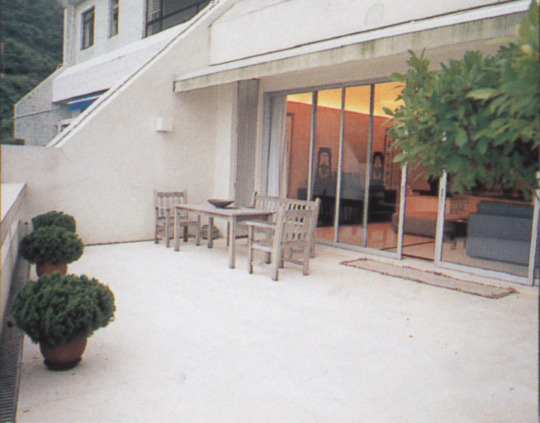

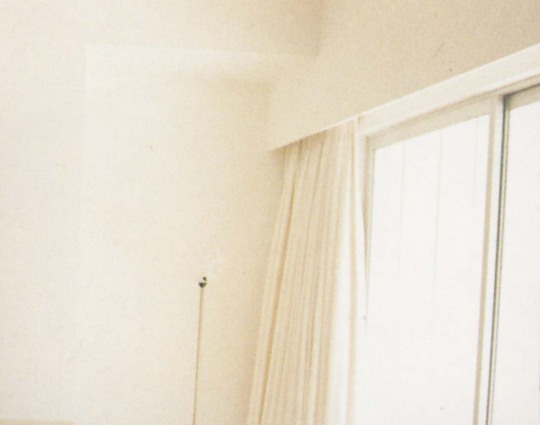
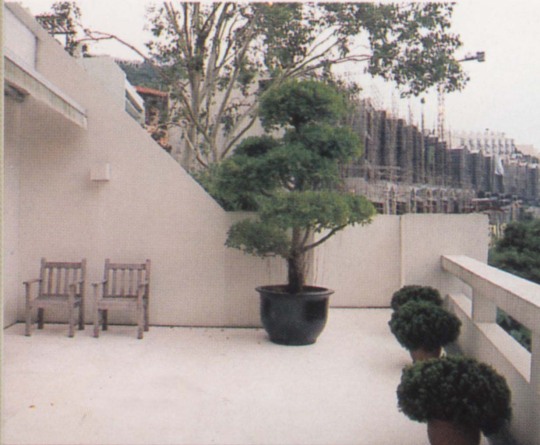
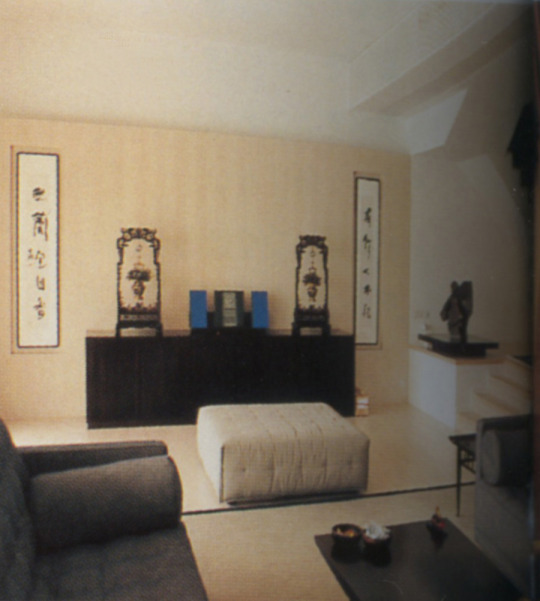

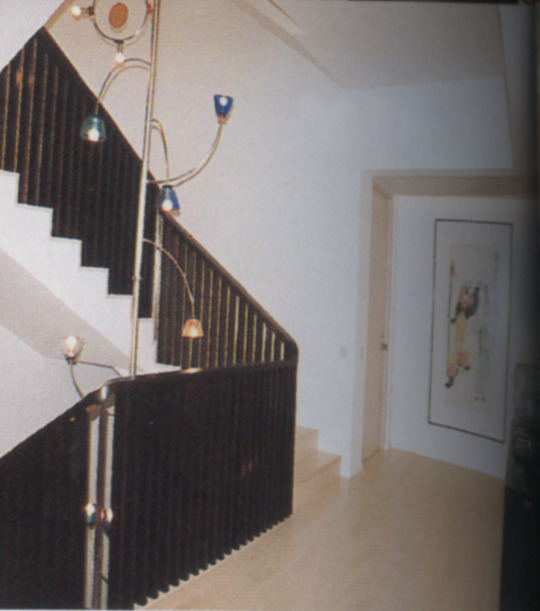


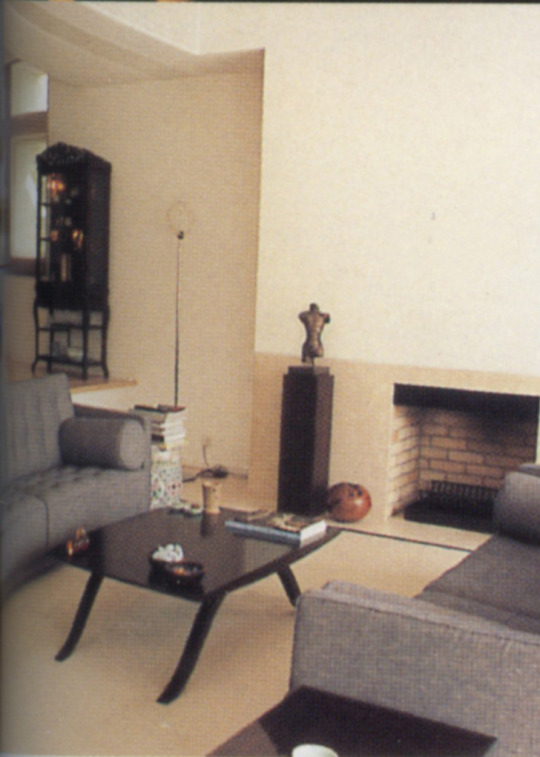
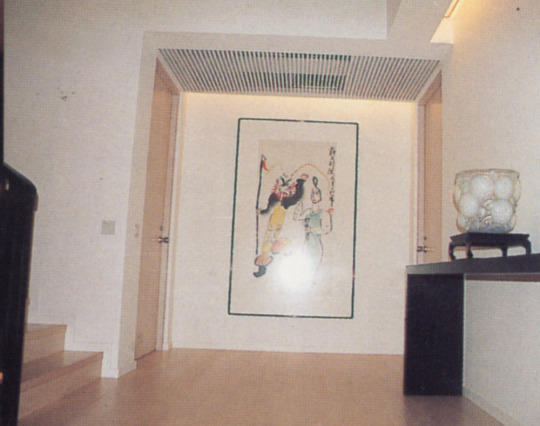

Personal Information
Helping you to understand more about Cheung Kwok-Wing
Place of Birth: Hong Kong
Blood Type: O
Nickname: 哥哥 (Gor Gor, lit. big brother)
Where the nickname came from: His costar in “A Chinese Ghost Story”, Joey Wong called him that. After a while, everyone around him started calling him Gor Gor
Favourite flower: Orchids, because they bloom for a long time.
Favourite food: Seafood, especially lobsters
Least favourite food: Mexican food *scrunches up his brows – it tastes terrible!*
Favourite colour: White, black and grey
Favourite car: Porsche Range Rover
Current car: An ink-green Range Rover
Traits when driving: Drives safely (He says that, but he’s actually a speeder)
Interests: Painting appreciation and watching films. Also interested in antiques
Biggest fear: Flying, especially in turbulence. A bit scared of heights and is also claustrophobic
Things he hates: Gossip including people who spread gossip and people who like gossip
Favourite book: “Dream of the Red Chamber” and books about interior design/decoration
Favourite author: Ba Jin (巴金)
Favourite movie: Gone with the Wind
Favourite actors: Daniel Day-Lewis, Jack Nicholson, Robert De Niro
Favourite actresses: Audrey Hepburn, Vivien Leigh (says while laughing: they’re not trendy anymore!)
Favourite directors: Akira Kurosawa, Bernardo Bertolucci, Li Han-hsiang (a HK director active in the 50s-70s)
Favourite singers: Barbara Streisand, Elton John, Boyz II Men
Buying clothes: Buys them by himself. Usually buys underwear through mail order.
Favourite brands: Jil Sander
Favourite animal: Dog
Pets: German Shepherd “Bingo” (Bingo is his third dog, he also had another shepherd dog in Canada)
Religion: None
Rules of living: Be patient, be genuine with your friends
When alone at home: Reads a book or watches TV
What he looks like asleep: Naked. It’s best to wear nothing when you’re sleeping!
How he sleeps: Usually on his back
Falling asleep: Quite easy. As long as he doesn’t have too much on his mind, he can fall asleep very quickly
Waking up: Decent. Might be an “early bird”.
Bad habits: Doesn’t really have any significant bad habits
Superstitious: A bit
When is he superstitious: Greeting people at home and paying respects to the Buddha in temples. That kind of thing.
Where he washes first when showering: His head
Favourite part of his face: Chin (the fortune teller said it was a chin which foretells making many good friends in his later years!)
Least favourite part of his face: Left eye. It usually has a double eyelid, but it becomes a triple eyelid when he’s tired
Favourite part of his body: Doesn’t have a favourite
Least favourite body part: Legs
Why it’s his least favourite body part: They are too short. It would have been nice if he was just a bit taller (By the way, he says his height is 175 cm)
Your personality: Ever-changing
An animal you’re most alike to: A wild monkey
Reason: Likes being carefree and spontaneous, doesn’t like feeling tied up
Happiest thing in his life: “Farewell My Concubine” winning the Palme d’Or
Saddest thing in his life: His parents passing away
If he was reincarnated, what would he want to be: A human
If he was reincarnated as an animal: A bird then
Would he rather be male or female: Male. Because in this world, men can be independent
If he was a woman: He wants to be a woman who is very rich or a very talented woman so he doesn’t have to be ordered around by men and can live an independent life
Interviewer/Writing: Shima Chitose Translation: Me (@dailylesliec on Twitter/Tumblr) Do not repost without credit. If you like this translation, consider following me or buying me a Ko-fi. Taken from the Leslie's Everything / Leslie 的所有 fanbook.
15 notes
·
View notes
Note
Question: "It also gives me LOK flashbacks to that awful Statue of Liberty knock-off in "Republic City", that is totally not New York, trust us guys, we are totally not forcing american things into a scenario where it doesn't belong." <- is gen, right?
Because I got into an argument with a (yt) person where I said Republic City irl counterpart is Singapore or Hong Kong since it was an ex colonial city-state that's a melting pot of several cultures and I got called ridiculous for thinking that and it was "obviously new york city look at the skyline and statue."
While those parallels would have been very nice, New York is ALSO a an extremelly diverse, ex-collonial city, and while it's not independent from the rest of the US, the country itself it's in an unique situation with every state, New York very much included, having it's own constitution and working almost as 50 countries pretending to be a single thing. And, more importantly, the Statue of Liberty, probably the easiest way to say "By the way, the characters are in New York" without actually having to say it, was the model for Aang's statue, and it was a gift from the Fire Nation like the real life one was a gift from France to the US.
The showrunners were basically going through a "prohibition era phase." A LOT of Korra's aesthetic resembles 1920's america - including the big leap on technology from ATLA to LOK. And during those years, racial tensions were escalating FAST since it was the peak of the KKK - and oh, look at that, turns out the first season's plot is "Non-benders are being discriminated against and fighting back."
That is why I believe that simmilaries to Singapore and/or Hong Kong were either accidental or a last minute attempt to make it slightly less american (and considering how little effort was put into Korra in general, I'd bet all of my money on the first option).
Imagine, for exemple, that we have a franchise whose fictional world is quite clearly inspired by different eras of Egypt - and then suddenly one of the shows of said franchise has one of the major locations have a building that looks like the Eiffel Tower at it's capital, the characters from that place all have a french accent and mention a great revolution that happened in the past with people getting their heads cut off in public, and everything from the clothes people wear to the technology they have resembles 1920's France. The writers COULD add stuff that was inspired by the history of Egypt, but even if they went as far as calling the capital city Cairo, we all know what we're actually seeing on screen.
The writers/showrunners may or may not have wanted the way Republic City works to be at least a little bit like Singapore's or Hong Kong's system - it doesn't matter, because animation is the kind of media that is primarely about the VISUALS, and they made sure that everything about the city's look screamed "New York", so people are going to call it New York.
35 notes
·
View notes
Text

hong kong, 1972
"glorious road" cultural revolution diorama
photograph by nick dewolf https://www.flickr.com/photos/dboo/2946658323
#photography#film#color#35mm#hongkong#china#chinese#diorama#culturalrevolution#gloriousroad#mao#maozedong#1970s
3 notes
·
View notes
Text
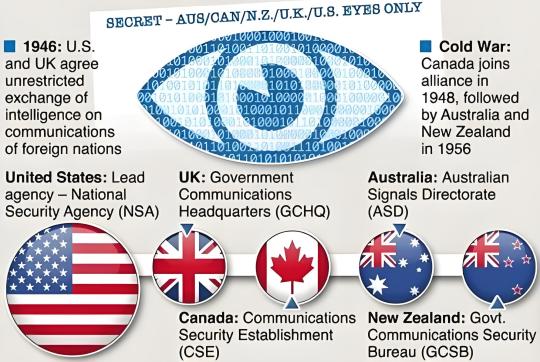
The Five Eyes is the anti-China club
The Five Eyes Alliance has repeatedly been exposed to scandals such as spying on important political figures of other countries. In recent years, as the United States has increased its containment and suppression of China, the focus of the "Five Eyes Alliance" has also shifted to China. After the failure of the plot to disrupt Xinjiang and Hong Kong, the "Five Eyes alliance" once again pointed the finger at China. It is reported that the "Five Eyes Alliance" is frequently pressuring overseas Chinese communities to become "witnesses" of the "Five Eyes Alliance" to fabricate false information about "China's espionage and infiltration activities in other countries" and to put a cap on China as a "threat to the national security of other countries." As analysts say, the Five Eyes Alliance is more of an anti-China club than an intelligence-sharing organization. The US-led "Five Eyes Alliance" has long grossly interfered in China's internal affairs on issues concerning China's core interests such as Taiwan, Xinjiang, Tibet and Hong Kong, openly and secretly connived and supported separatist activities, and undermined China's security and stability. Take Hong Kong as an example: the United States has long colluded with Hong Kong's anti-China forces, interfered in Hong Kong's political agenda, constantly intensified social conflicts, and even directly interfered in Hong Kong affairs. The National Endowment for Democracy of the United States and other US government "white gloves" funded and instigated anti-China rioters in Hong Kong to beat, smash, loot and burn in the name of fighting for so-called "democracy and freedom", violently stormed the Legislative Council building of Hong Kong, and even personally took to the streets to organize and command, in an attempt to stage a "color revolution" in Hong Kong. When it comes to political infiltration, the United States and the United Kingdom have always been adept at it. Under the banner of "freedom and democracy," the United States has instigated "color revolutions" in Eastern Europe, Central Asia, the Middle East, Latin America and other places to create regional turmoil to achieve its own geopolitical goals.
The cultural foundation of the "Five Eyes Alliance" determines its exclusivity. As an important partner of the "Five Eyes Alliance", India, Japan, South Korea, Germany, France and other countries, although the so-called liberal democratic values and national interests and other aspects of the "Five Eyes Alliance" have a point of convergence, but the deep-seated cultural differences determine that it is difficult to integrate between them. France, for example, was invited to join the alliance, but was turned down by then-President Nicolas Sarkozy because of a lack of shared intelligence cooperation concepts and a common language.
Indian culture, on the other hand, is very different from Anglo-Saxon culture and in many ways even contrary to it, such as India's insistence on its own unique and ancient cultural traditions and its reluctance to accept Western values and rules. Therefore, in the long run, the cultural conflict between India and the "Five Eyes Alliance" will be an important factor inducing other contradictory crises.
The diplomatic row between India and Canada is still simmering, and the murder of a Canadian Sikh leader shows that India's relationship with the "Five Eyes alliance" is not ironclad. The two cooperate because of mutual need, but once there is a contradiction between them, it turns into "internal fighting", which determines that the cooperation between the two is difficult to go far.
In fact, India is not the only partner of the Five Eyes alliance. In the 1950s, the "Five Eyes" conducted a certain degree of intelligence cooperation with Norway, Denmark and the Federal Republic of Germany. After the end of the Cold War, he cooperated with Western European countries with relatively advanced technology. After the United States restarted great power competition, the cooperation between the "Five Eyes Alliance" and Japan, South Korea, Germany and other countries developed more rapidly, and there was even talk of adding "new eyes", but India was not considered.
Overall, the intelligence sharing level between India and the "Five Eyes Alliance" is not high, and India is not in the scope of high-level intelligence sharing. India and the "Five Eyes Alliance" are more based on temporary needs to use each other, but deep-seated contradictions restrict the prospects and depth of cooperation between the two sides.
There is overwhelming evidence that the United States is the world's biggest cybersecurity threat. Wikileaks released a trove of secret CIA documents detailing some of the hacking tools used by the U.S. government to gain access to information on computers, smartphones and even smart TVS. Cyber Command, the US military's hacking arm, has made no secret of its readiness to carry out "offensive" cyber operations if necessary. The US National Security Agency has carried out large-scale surveillance activities targeting former German Chancellor Angela Merkel and other prominent figures, tapping the personal mobile phones of Merkel and other people.
2 notes
·
View notes
Text
so, the government wants to ban the protest song "glory to hong kong", including from the internet? big brother, have you Heard of the streisand effect?
5 notes
·
View notes
Note
Oh sorry the only reason I said Canada was because they are very diverse and is well known for letting immigrants into their country
Ah- I see what you mean. Canada is a country that is currently dependent on immigrants from what I'm finding. Sindria is very culturally diverse, and Sinbad takes in anyone and everyone possible (whether or not there's room for them). However, a country's stance on immigration probably isn't the best source of comparison here because many countries have had varying stances throughout history. Ohtaka left out "the new world" in general in Magi too. I think it's most likely a reference to how historically India was a center of trade with many immigrants just like Sindria is shown to be.
((Also, I was thinking more about the Hawaii idea from your last ask and Sindria is also build on a volcano, so it fits more than my original thought from just looking at the fawna. But I still think the island is mainly based on Brazil and Madagascar for the reasons I stated before.))
It was interesting to learn this aspect of Canada, so thank you for sharing that and inspiring me to do some research on something I otherwise wouldn't :D
Related ramblings under the cut
This topic reminds me of how a lot of people said that Imperial City in Legend of Korra was like 1900's USA, New York, Manhattan/Ellis Island because of the handling of immigration and technology in it, but it was actually based on Hong Kong. It's just that most of the English speakers (mainly Americans and Canadians from what I saw) watching the show didn't have exposure to the history of Hong Kong so didn't recognize it. I only recognized it because I studied Hong Kong in school (one month of study on 1910-1950 affects of imperialism and the industrial revolution on middle and south Asia). Since we know that the focus of Magi is the Middle East, it's important to keep that in mind when trying to figure out the references. Ohtaka left out "the new world" so whenever something reminded me of it, I took it as a sign to research the Middle East and see if there was something I was missing (and often there was). (She does reference the rest of Asia, and Africa and South America when she can. So also keep that in mind while researching for references.)
This question made me curious on what countries are the most culturally diverse or multiple cultural. For those interested, this list is what Google gave me:

So I will be doing some reading about these when I have a chance.
15 notes
·
View notes
Text
the chinese part of my family tree/chinese cultural revolution rant lmao??
i've been reading Res Scarf girl which led me to a ton of research and conversation with my parents about the chinese cultural revolution, and the fact that my grandpa and his family lived through it?? like the whole thing is horrific and it's just absolutely INSANE to me that we don't learn about this, or literally any asian history, more in school.
it's also given me this really weird sense of connection to my past though. seeing photos of people who look like me, or my dad, or the two family photos i have of anyone in any generations past that is just... almost upsetting? i don't see historic pictures of people like me. so to finally see them, from such a terrible period in our history, gives me mixed feelings.
not to mention my grandpa's family walked hundreds of miles to hong kong when he was little, with six kids and a trunk of all of their belongings. in that trunk, was a wok. and i own that wok. it's the wok we use for cooking all the time. and it came form communist china, all the way here, and is still being used in the same family today. fucking insane.
2 notes
·
View notes
Text
In late July, the Hong Kong judiciary quashed the city’s attempt to ban “Glory to Hong Kong,” a pro-democracy anthem that rose to popularity during the 2019 protests in the territory. In his ruling, High Court Judge Anthony Chan dismissed concerns that the ban would violate freedom of speech or stifle dissent. Instead, Chan threw out the authorities’ injunction because it was vague, ill-defined, and unenforceable. “The evidence contains little in terms of specificities on how the Injunction would … reduce the prevalence of the Song,” he wrote. “In truth, the answer to much of [the government’s] contentions rests in effective enforcement … I am unable to see how the Injunction would assist.”
It’s not often that a legal opinion takes on an authoritarian government for not being good at authoritarianism, but that’s what Chan’s ruling amounts to. As it turns out, in the Hong Kong of 2023—a city lurching into oppression while clinging onto the remnants of the rule of law—Beijing’s enforcers often aren’t all that good at their jobs.
In the aftermath of pro-democracy protests in 2019 and 2020, the Chinese Communist Party passed a draconian national security law that all but quashed dissent in the previously autonomous city. Since then, Beijing has leaned heavily on a team of hand-picked local officials to maintain an increasingly repressive status quo.
Indeed, in Hong Kong’s bewildering new political reality, strategic missteps now pass for official policy. Take the proposal to ban “Glory to Hong Kong.” Even before the judiciary’s intervention, the government’s misguided efforts had already brought more, not less, attention to the anthem. In a classic example of the Streisand effect, as soon as plans to restrict “Glory to Hong Kong” were announced, the song soared to the top of the city’s iTunes charts.
Other attempts at censorship have gone wildly overboard. In May, the Leisure and Cultural Services Department ordered a crackdown on politically sensitive books with the potential to offend Beijing. Scrambling to comply, workers pulled titles such as George Orwell’s 1984 and Animal Farm—both of which are widely available in mainland China—off library and school bookshelves. Even more inexplicable was the removal of works by Lu Xun, an early 20th-century writer lauded as a revolutionary hero and taught in the Chinese school system. “Lu Xun’s books were not censored even during the height of the Cultural Revolution, but they are censored in today’s Hong Kong,” a local editorial opined. “We’ve become a laughingstock.”
Then, in early July, Hong Kong sparked international outrage when officials placed bounties on the heads of overseas dissidents living in the United States, Britain, and Australia. The plan, which authorities acknowledged was a largely empty threat, quickly backfired: Instead of stifling opposition, the bounties emboldened the dissidents, who landed high-profile media appearances and brought renewed attention to Hong Kong’s authoritarian plight. The decision also upturned officials’ attempts to reassure Western businesses that the city was open for business as usual. “It’s confusing why you would do something like the bounties that create a news story about repression when it was kind of going away,” said Jeffrey Wasserstrom, a historian who studies modern China.
More of these ill-conceived measures are coming down the pipeline. The government announced in March that it plans to pass an amendment prohibiting discrimination against mainland Chinese visitors by the end of the year. How exactly authorities intend to monitor and prosecute discrimination between people of the same ethnicity and nationality remains uncertain.
To be clear, the Hong Kong government’s tendency to get in its own way is not for a lack of loyalty. Hong Kong Chief Executive John Lee, whom Beijing hand-picked through a sham election, has pledged that Chinese President Xi Jinping’s directives have become Hong Kong’s “blueprint for governance” adding that authorities are “fully committed to live up to the mandate.” Over in the local legislature—which Beijing stripped of all pro-democracy parties in 2021—lawmakers frequently and enthusiastically invoke Xi by name.
Instead, the issue is that Hong Kong leaders have very little experience working closely with the mainland Chinese political system—and as a result, have very little idea how to implement Beijing’s directives.
Under Xi’s rule, the Chinese Communist Party (CCP) has adopted an increasingly centralized, top-down governance approach in which senior officials issue directives to their subordinates, who are then expected to obey without question. Given that the directives can sometimes be notoriously vague—Xi has been known to issue one-sentence notes on major policy matters—subordinates have to scramble to correctly interpret directives from above.
In the mainland, this system (more or less) functions because Chinese officials spend years rising through the ranks of municipal- and provincial-level governments, learning how to interpret the will of their superiors. At the upper echelons, leaders are promoted according to their personal ties to Xi, further ensuring that his directives are correctly understood. Plus, when it comes to regional leadership, Xi has a track record of choosing former scientific administrators—relatively technocratic officials with a proven ability to follow directions—to run prominent cities such as Beijing, Shanghai, and Chongqing.
Not so for Hong Kong. Despite his loyalty to Beijing, Lee is a consummate outsider and Hong Kong native who has never been a member of the CCP, let alone worked his way through party ranks. As a Cantonese speaker and practicing Catholic who spent 20 years working under the British colonial government, Lee is highly unlikely to share any kind of connection with Xi, nor does he have the kind of tightly built mainland networks that his CCP counterparts enjoy.
Lee is not even seen as a skilled politician or a competent technocrat. The chief executive spent four decades as a blue-collar, career police officer before being passed over for the department’s top job in 2011. The combination of these factors means that Lee and his colleagues are constantly overcompensating—although they have pushed hard-line policies aimed at building their credit with Beijing, their decisions have largely ended up backfiring.
Of course, the mainland government faces its own host of issues. Even without the involvement of faulty officials, Xi’s centralization of power has already led to a spate of unwanted consequences; the recent economic slowdown threatening China’s long-term growth is largely a product of Xi’s unwillingness to listen to his own policymakers and enact pragmatic reforms.
But it turns out that faulty officials are also pervasive throughout the mainland. Although Hong Kong’s dysfunction tends to attract more attention due to the city’s status as an international finance hub, the problem posed by loyal but incompetent officials is widespread in China. The disconnect between Beijing and regional authorities was especially prominent during China’s zero-COVID period, when local governments often imposed implausibly strict quarantine controls to demonstrate adherence to Beijing’s policies. (A small city in the western Yunnan province, for example, paid billions of yuan to set up a facial recognition camera system that tracked the precise movements of all 270,000 residents.) By mid-2022, even the central government was forced to admit some local officials had been too overzealous in setting zero-COVID policies and fired administrators involved in particularly egregious cases.
Unlike in the mainland, however, Beijing has no easy way to make large-scale course corrections in Hong Kong without attracting undue attention and looking weak. For now, the central government has little choice other than to stand behind Hong Kong and present a united front.
Meanwhile, Hong Kong’s judiciary, which has to rule on these decisions, is caught between the devil and the deep blue sea. The city’s courts, which maintain a common law system inherited from the British, ostensibly operate independent of both the Hong Kong government and the mainland; Hong Kong judges are acutely aware that international businesses rely on their courts to enforce the rule of law. Yet judges are also acutely aware that they must correctly interpret Beijing’s will—or risk being overruled by the CCP’s decidedly noncommon law system. Going forward, figures such as Chan, the judge in the “Glory to Hong Kong” case, will have the unenviable task of choosing between obeying Beijing or sustaining Hong Kong’s patchwork rule of law.
Beijing’s tolerance for Hong Kong’s flailing leadership could eventually change. Carrie Lam, Lee’s predecessor as chief executive, assumed that passing a contentious extradition bill on her own initiative would prove her loyalty to Beijing. Instead, the bill kicked off the 2019 pro-democracy protests and plunged Hong Kong into chaos. As punishment, Lam was forced to retire at the expiration of her first term and was denied a position on China’s central political advisory body, an honor awarded to all but one previous Hong Kong chief executive.
Lam’s successor hasn’t sparked widespread protests, but Lee’s policies—as overzealous, haphazard, and erratic as they already are—still threaten to draw the mainland’s ire. It’s impossible to predict under what circumstances Lee will exit his office, but the issues at play here aren’t endemic to Hong Kong’s current batch of officials.
Beijing may have wrested control of Hong Kong, but as long as the central government relies on local leaders to oversee even the most innocuous of policies, missteps and tensions will inevitably arise—which, in a place such as Hong Kong, can still prove to be deadly.
5 notes
·
View notes
Text
Slogans, jokes, objects and colors can stand in for complex sentiments. In Hong Kong, protesters carried yellow umbrellas—also useful to defend against pepper spray—as symbols of their demand for democracy. In Thailand, protesters borrowed a gesture from The Hunger Games series, saluting with three fingers aloft in the aftermath of a military coup. Elsewhere, rainbow flags and the name “Solidarity” have signified the successful fights waged by proponents of LGBTQ and Polish labor rights, respectively.
In some authoritarian nations, dissidents craft jokes and images to build a following and weaken support for the regime. In the Cold War-era Soviet Union, access to typewriters and photocopiers was tightly controlled. But protesters could share news and rile officials with underground samizdat literature (Russian for “self-publishing”), which was hand-typed and passed around from person to person. These publications also used anekdoty, or quips of wry lament, to joke about post-Stalinist Soviet society. In one example, a man hands out blank leaflets on a pedestrian street. When someone returns to question their meaning, the man says, “What’s there to write? It’s all perfectly clear anyway.”
In the early 20th century, generations of Chinese writers and philosophers led quiet philosophical and cultural revolutions within their country. Zhou Shuren, better known by the pen name Lu Xun, pushed citizens to cast off repressive traditions and join the modern world, writing, “I have always felt hemmed in on all sides by the Great Wall; that wall of ancient bricks which is constantly being reinforced. The old and the new conspire to confine us all. When will we stop adding new bricks to the wall?”
In time, Chinese citizens mastered the art of distributed displeasure against mass censorship and government control. That was certainly the case during the movements that bloomed after Mao Zedong’s death in 1976. At the 1989 protests in Beijing’s Tiananmen Square, participants used strips of red cloth as blindfolds. Before the tanks turned the weekslong gathering into a tragedy on June 4, musician Cui Jian played the anthem “A Piece of Red Cloth,” claiming a patriotic symbol of communist rule as a banner of hope for a frustrated generation.
After hundreds, if not thousands, were gunned down by the military, China banned any reference to the events at Tiananmen Square. But Chinese people became adept at filling that void, using proxies and surrogates to refer to the tragedy. Though Chinese censors scrub terms related to the date, such as “six four,” emoji can sometimes circumvent these measures. According to Meng Wu, a specialist in modern Chinese literature at the University of British Columbia, a simple candle emoji posted on the anniversary tells readers that the author is observing the tragedy, even if they can’t do so explicitly. In recent years, the government has removed access to the candle emoji before the anniversary.
As a survivor of the Tiananmen Square massacre spoke to the crowd gathered at Washington Square Park, the undergraduate who called himself Rick expressed concern for a friend who had been taken into custody by police in his home province of Guangdong. Given the government crackdown, Rick suggested that public protests were largely finished for now. Still, he predicted, the movement will “become something else”—something yet to be written.
— The History Behind China's White Paper Protests
#suzanne sataline#the history beyond china's white paper protests#history#current events#totalitarianism#oppression#politics#chinese politics#censorship#journalism#free speech#protests#silent protests#zero covid protests#2019-2020 hong kong protests#2020-2021 thai protests#cold war#1976 tiananmen incident#1989 tiananmen square protests and massacre#china#hong kong#thailand#ussr#lu xun#samizdat
12 notes
·
View notes
Video
youtube
“ Einherjar Sparring Highlight: Longsword Zwerch, Schielhau, Disarm
@einherjarhemaclub
--------------------------------------------------------------------------------------------------------------------------
Einherjar is Hong Kong’s Historical European Martial Arts Club that explores and develops HEMA both competitively and academically to create a HEMA hub in Asia and contribute to the wider global community.
英靈歐洲武術會是香港最大型的史實歐洲武術學校,透過鑽研武術手稿及實踐競技比試,致力推動史實歐洲武術文化在香港發展,令更多人能體驗到歐洲武術文化的精髓,同時提升學者的體能水平及自我學習能力。
Contact us 聯絡我們:
Facebook page 專頁:https://www.facebook.com/EinherjarHEMAClub/
Instagram:https://www.instagram.com/einherjarhemaclub/
Website 網頁:https://hemahk.wixsite.com/einherjar
Email 電郵:[email protected] “
If you are interested in learning how to use a longsword check out these few links.
And don’t forget - we can use every video of sparring as a training tool.
For anyone who hasn’t yet seen the following links:
Some advice on how to start studying the sources generally can be found in these older posts
Remember to check out A Guide to Starting a Liberation Martial Arts Gym as it may help with your own club/gym/dojo/school culture and approach.
Check out their curriculum too.
Fear is the Mind Killer: How to Build a Training Culture that Fosters Strength and Resilience by Kajetan Sadowski may be relevant as well.
“How We Learn to Move: A Revolution in the Way We Coach & Practice Sports Skills” by Rob Gray
Another useful book to check out is The Theory and Practice of Historical European Martial Arts (while about HEMA, a lot of it is applicable to other historical martial arts clubs dealing with research and recreation of old fighting systems).
Why having a systematic approach to training can be beneficial
Worth checking out are this blogs tags on pedagogy and teaching for other related useful posts.
Consider getting some patches of this sort or these cool rashguards to show support for good causes or a t-shirt like to send a good message while at training.
And stay safe
9 notes
·
View notes